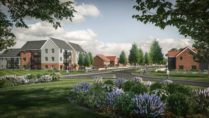Motivating the silent majority
The secretary of state, Michael Gove MP, has said he wants to see local communities involved more in planning policy and planning application decisions. This brought a sharp intake of breath from developers and councillors alike as most communities appear opposed to anything to do with development. This is because only those opposed are motivated enough to participate in consultations, thus giving that perception publicly and with politicians.

Cecille Arcurs
Consultation is inherently biased against development and not truly reflective of wider community views. If the whole community was to be involved, if the usually silent majority could be motivated to participate, it is thought that more balanced and helpful opinions would come forward to assist politicians and developers in understanding the true feelings and aspirations of the community.
Chelgate is currently working with Survation, one of the country’s leading political polling and market research companies, to explore this further. Survation is currently undertaking a survey of all 19,000 councillors in England to find out their views on local consultation: whether they think residents should be more involved in planning, whether they consider the outcomes of developer consultations to be biased, whether they survey their constituents, and whether they think independent research into public opinion locally would be useful.
Any local plan or planning application is accompanied by a plethora of reports and assessments, all completed in detail to exacting standards with evidence bases, and often voluminous. But when it comes to the public consultation and political engagement there is practically nothing, with little or no scientific rigour to how it should be conducted or how the results are analysed.
Applicants and politicians alike make decisions based on their perception of responses and community views, which is not right and can lead to misguided and poor decision making.
Undertaking independent market research will provide unequivocal data representing the true views of the wider community, including those hard-to-reach groups. Understanding real community views provides a basis for proper development-specific consultation instead of relaying on perceptions and hearsay. Applicants, ward councillors and planning committees, as well as the wider communities themselves, would all benefit from such data.
We will be reporting the outcome of the Survation councillor research in the next issue of Forward Planning.

Strategic land and site promotion
“Chelgate gives a real insight into political thinking at all levels and all political persuasions, …

Energy and infrastructure
From new nuclear and unconventional gas to renewables, waste and airports, our team has worked …

